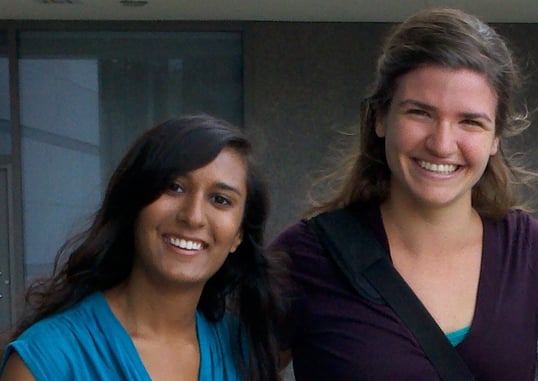
Rahela Aziz-Bose and Julia Randall are launching a new program to teach fundamental health education classes to juveniles in state correctional facilities.
Saddened by the dismal health statistics of young adults behind bars, second-year medical students Julia Randall and Rahela Aziz-Bose are launching a new program to teach fundamental health education classes to juveniles in state correctional facilities. They hope to impart essential life lessons that will help them make better decisions.
Randall was awarded a 2013 Schweitzer Fellowship for the project that brings her and Aziz-Bose into Worcester-area juvenile correctional facilities run by the Massachusetts Department of Youth Services to teach a health education curriculum.
“While DYS offers educational programming focused on literacy skills and future employment, there is currently little funding for health education and many youth in these facilities don’t have access to health or sex education,” said Randall.
Through research, Randall learned that incarcerated adolescents are at higher risk for STIs and HIV, are more likely to participate in high-risk sexual behavior and less likely to use condoms and have higher rates of substance use during sex. She came face to face with these serious health issues when she had an opportunity to shadow her academic mentor, Diane Blake, MD, associate professor of pediatrics, who is the supervising physician at the clinic in the Allen Hall secure DYS treatment facility in Westborough.
“When shadowing [Dr. Blake] at DYS I spoke to the nurse on staff and learned that here was a need for health education. She told me that many of the boys have been in and out of school and have never had any real health education,” said Randall. “Her interactions with them about body, nutrition or healthy relationships were usually met by blank stares.”
Randall and Aziz-Bose were both hoping to build on their past experience teaching health education and serve an at-risk population they had not interacted with before. As an undergraduate, Aziz-Bose taught health education workshops to public high school students in New Haven and rewrote part of an established STI and contraception curriculum to emphasize communication and protection. Randall ran a high school youth group that emphasized inclusive and open communication and developed a healthy lifestyle curriculum for a community-based program for immigrant families.
Last spring, the pair received an MLK Semester of Service grant from UMMS and used the funds to purchase supplies and materials for the curriculum, including anatomical models and posters, birth control training kits and condoms for demonstration purposes. They surveyed 18 boys at Allen Hall so that they could shape the curriculum to fit the specifics interests of this population. The topics most in demand were STIs; nutrition and exercise; anatomy and puberty; healthy relationships; basic first aid; and contraception and pregnancy.
In April, they began pilot testing the workshops at Allen Hall and at the Paul T. Leahy Center short-term facility in Worcester.
“The response was fantastic,” said Randall. “Students were excited to come to the sessions and it was obvious from the questions they were asking that they had been discussing the topics outside of the workshops. We also heard from the in-house clinical staff that the types of questions that the participants were asking them were different as a result of the workshops.”
“The classes are very interactive and include role-playing, acting out scenarios, demonstrations with anatomical models and posters and discussions,” said Aziz Bose. “Participants know that they can ask anything. We’re not just presenting them with facts; we’re providing them with tools to use in decision making.”
Over the summer, Randal and Aziz-Bose fine-tuned the curriculum using feedback from the spring sessions and they also each separately travelled to Ecuador for a month—funded by an Arnold P. Gold Foundations Summer Service Fellowship—to present a condensed version of the curriculum in Spanish in rural schools and health clinics. They worked in collaboration with the Yale-Ecuador HIV Clinic Initiative and focused primarily on the sexual health aspects of the curriculum.
“While Julia was in Ecuador in June, I was here revising the curriculum using data collected from the spring workshops, and while I was in Ecuador in July, Julia was here in Worcester teaching the workshop series to residents in five different DYS centers,” said Aziz-Bose.
In the fall, Randall and Aziz-Bose will begin teaching the revised curriculum to youth in Worcester area DYS facilities and have added a unit on teen pregnancy so that they can begin teaching the curriculum to adolescent girls in DYS facilities.
In addition to ambitious plans for teaching the curriculum, Randall and Aziz-Bose are hoping to build sustainability into the project by founding an interest group of like-minded medical and nursing students who can carry the project forward as Randall and Aziz-Bose move onto their clinical training years. They also hope to establish an optional enrichment elective for students who are interested in learning about correctional health, including issues related to juvenile and geriatric populations.
“Research indicates that adolescent health education is far more effective at curbing unhealthy behaviors than interventions targeted at adult populations that have already established patterns of unhealthy behaviors,” said Randall.
By reaching out to juveniles in the justice system, she and Aziz-Bose are betting on not only the future of these young boys and girls, but also on the future of the communities they will return to and on the future model of health care that must rely on education and prevention to succeed.